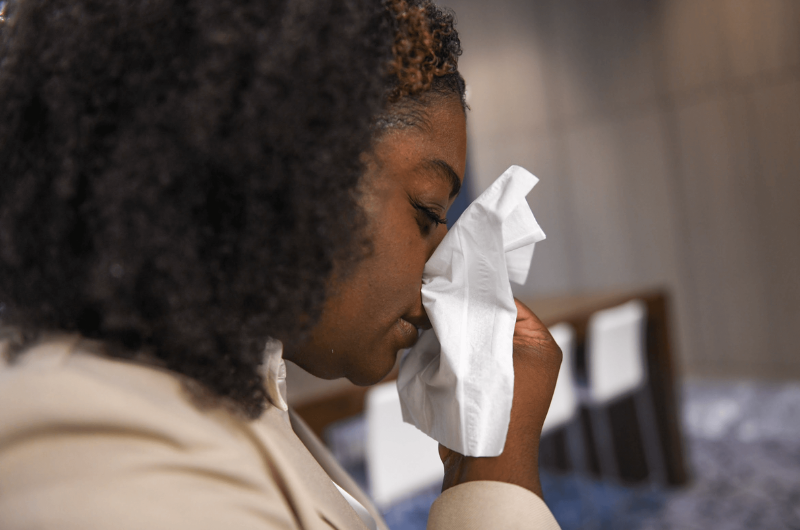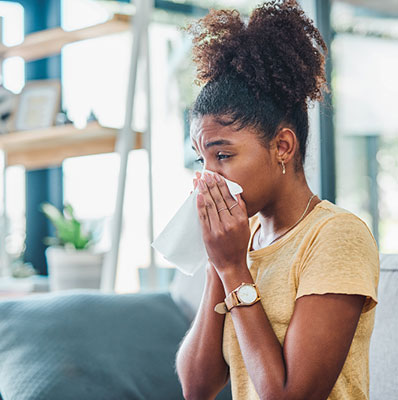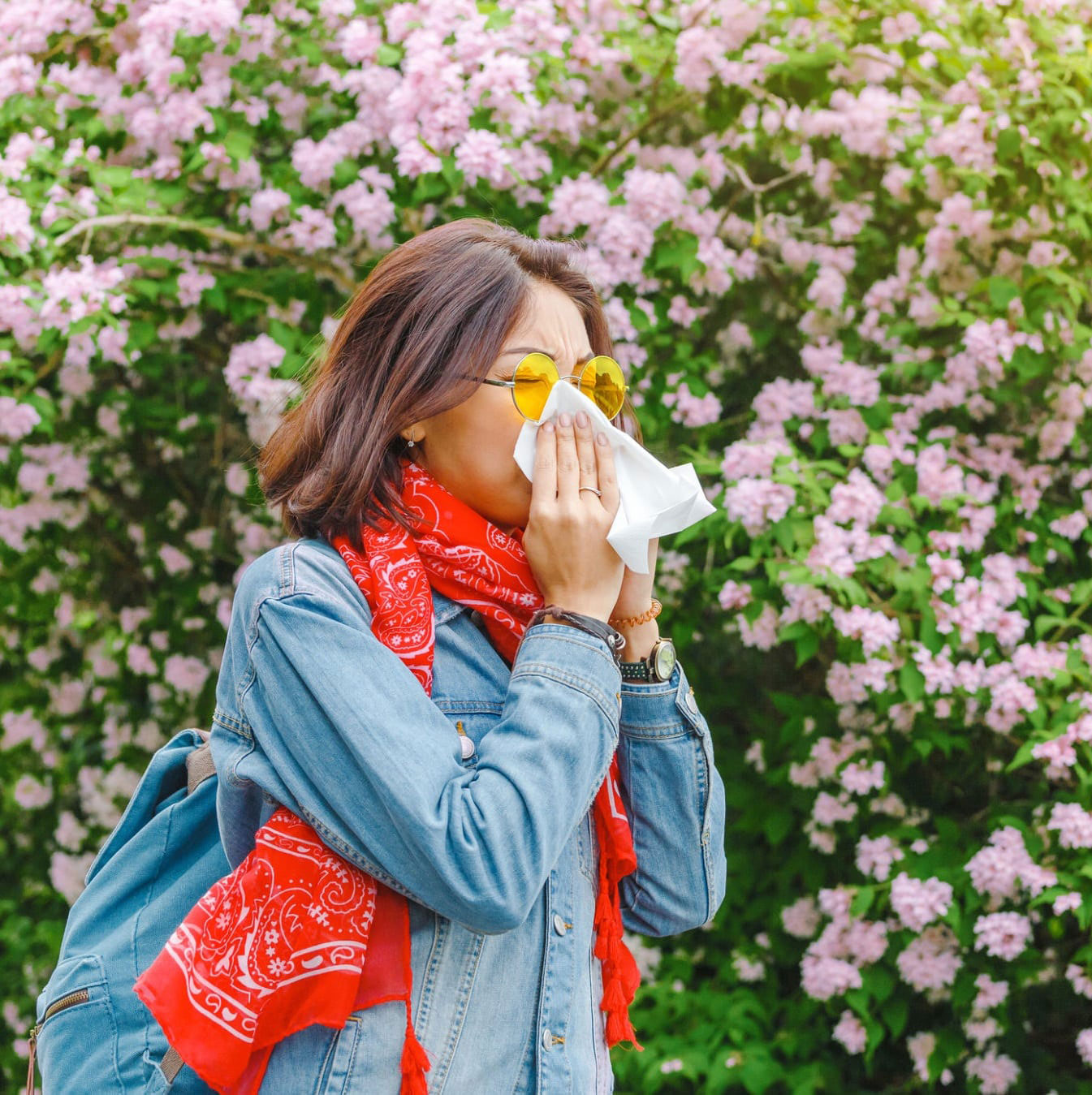What to Do When Pollen Count is High

June 11, 2024
Warm breezes, sunshine and beautiful blooms. There's so much to love about this time of year, but it also brings high pollen counts that can wreak havoc on your body.
If you find yourself sneezing, congested and struggling with itchy eyes, you’re not alone. The U.S. Centers for Disease Control (CDC) reports that about one-quarter (25.7 percent) of all American adults experience seasonal allergies.
So, how can you tell if these pesky symptoms are allergies or something else? And what can you do to minimize your symptoms when pollen is in the air?
Recognizing the Signs of Seasonal Allergies
Allergic rhinitis (seasonal allergies) is one of the most common chronic diseases. It affects millions of people each year, especially when pollen levels spike from March to May. According to Dr. Nagaria, the typical signs of seasonal allergies include:
- Frequent sneezing
- Itchy, watery eyes (allergic conjunctivitis)
- Occasional coughing
- Runny or congested nose
- Scratchy throat
“During high pollen counts, you could have symptoms like sneezing, a runny nose, nasal congestion and itchy eyes,” says family medicine physician Zain Nagaria, M.D. “Many people mistake these symptoms for viral infections, but allergies typically don’t cause things like body aches or fever, and viruses often do.”
Allergic rhinitis can also make other conditions such as asthma or sinus infections worse, especially if you have a deviated septum. If symptoms last for more than ten days or worsen with fever and eye discharge, Dr. Nagaria suggests it might be time to talk to your doctor to rule out bacterial infections.
Minimizing Pollen Exposure
When pollen counts are high, lowering or avoiding exposure is your best bet for managing symptoms. Dr. Nagaria suggests several strategies to help you avoid pollen:
- Avoid outdoor activities in high-pollen areas: "Stay away from places with lots of trees and grasses, especially during peak pollen times," advises Dr. Nagaria.
- Keep windows closed: To prevent pollen from entering your home, keep windows closed and use air conditioning if necessary.
- Shower and change clothes: After spending time outside, shower to remove pollen from your hair and skin and change into clean clothes.
- Clean contact lenses: If you wear contacts, thoroughly clean them to avoid pollen buildup.
Also, keep in mind that rain can temporarily reduce pollen levels, and pollen counts generally decrease as summer approaches.
Find Relief with Over-the-Counter Options
If pollen exposure is unavoidable and you notice its unwanted effects on your respiratory system, your next best solution is turning to over-the-counter medications. Dr. Nagaria recommends beginning with:
- Flonase (intranasal corticosteroids): Best for reducing inflammation and congestion
- Oral antihistamines: Medications like Zyrtec can help control sneezing, itching, and runny nose
“For mild symptoms that don’t significantly impact daily activities, start with nasal sprays or oral antihistamines,” says Dr. Nagaria. But follow the directions closely and don’t overuse these medications — if you use them too much or too long, or in the wrong way, they could be ineffective or cause rebound congestion or headaches.
“A lot of times people use nasal sprays incorrectly by sniffing deeply after spraying, and it goes down their throat rather than staying in the nasal passages,” emphasizes Dr. Nagaria. “Make sure you follow the proper technique for nasal sprays.”
If initial over-the-counter treatments don’t work, Dr. Nagaria suggests switching the type of antihistamine or consulting an allergy specialist for further evaluation. In cases of severe symptoms, a doctor may prescribe intramuscular steroids, but that’s usually a last resort.
Also, it’s important to note that older adults should be cautious with antihistamines. Older adults are often more sensitive to medications, and antihistamines can cause side effects like confusion, dizziness, unsteadiness, dry mouth, urinary retention, worsening dementia symptoms and others. For that reason, this age group may benefit from a trial period to determine the effectiveness.
When to Turn to Your Doctor
While many allergy symptoms are manageable at home, there are times when professional help is necessary. You don’t have to “suffer through it.” Dr. Nagaria recommends seeing a doctor if:
- Symptoms severely affect your work, school, or daily activities
- You experience significant congestion or difficulty breathing
- Over-the-counter medications fail to provide relief
- You have seasonal allergies that aren't resolving AND you suffer from asthma or it’s worsening your asthma; an allergist may prescribe allergy shots (biologics) which are proven to help both conditions
“For severe cases, especially if it affects your quality of life, it’s important to seek medical advice,” advises Dr. Nagaria. “You may need allergy testing or more advanced treatments.”
Understanding your allergies and staying proactive can make a big difference in managing your symptoms during high pollen counts. Keep track of daily pollen levels in your area and adjust your activities accordingly. Turn to medications that work best for you and lean on strategies to reduce exposure. And don’t hesitate to turn to your doctor for help if needed.
For more information and resources on the current pollen count and managing seasonal allergies, visit credible health websites like theNational Allergy Bureau and local weather services, which provide real-time pollen level updates and forecasts. Consult with health care professionals to ensure you have the most up-to-date and effective strategies.
“Educate yourself about what triggers your allergies and how to manage them,” emphasizes Dr. Nagaria. “Taking the right steps can help you enjoy the season with fewer disruptions.”
Next Steps & Resources
- Meet our sources: Zain Nagaria, M.D.
- To make an appointment with a doctor near you, call 800-822-8905 or visit our website.
The material provided through HealthU is intended to be used as general information only and should not replace the advice of your physician. Always consult your physician for individual care.







